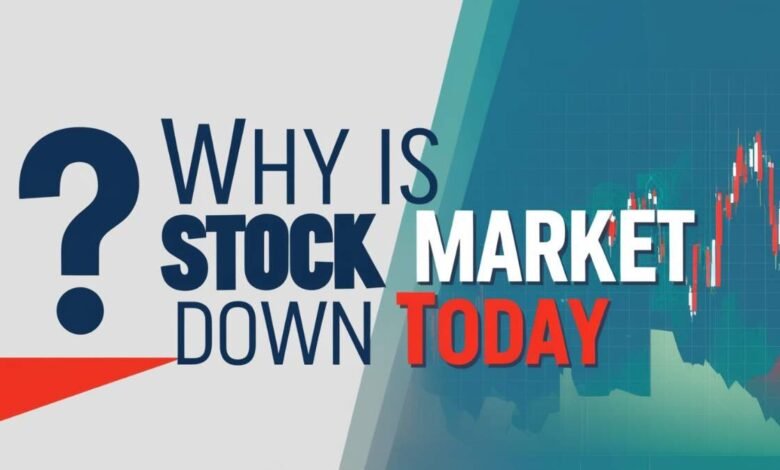Why Is Stock Market Down Today: Expert Insights
Why Is Stock Market Down Today

Why is the stock market down today investor sentiment and world events are contributing factors. Therefore, when the market falls, it’s always necessary to find the causes and their broader implications. Today, it can be due to inflation data, jobless claims, Federal Reserve rate expectations, and overall market performance. Let’s go a little deeper into what is pulling the market down.
H2: Effect of Inflation Data on the Stock Market
Impact of Inflation Data on Investor Psychology
Interpreting inflation data simultaneously changes how investors perceive the economy’s performance. High inflation rates cause unease because they reduce consumers’ purchasing power and increase business costs, thereby creating bearish market conditions.
Trends of Core CPI and Market Response
The underlying core Consumer Price Index, excluding volatile food and energy prices, may be a critical indicator of underlying inflation. This sharp spike in the trend of core CPI raises sticky inflation concerns and fears that the Fed may not cut its rates or hike them, thus fueling the sell-off in equities. Sectors like tech and real estate are highly susceptible to changes in borrowing costs.
H2: Growing Jobless Claims and Economic Uncertainty
What Do Growing Jobless Claims Say?
Growing jobless claims signal slowing labor. Slowing the jobs market would be a kind of balm to inflation, but it has implications for slowing the economy, too. Stock buyers fear the adverse risk to corporate earnings and stock prices.
The Impact on Consumer Expenditure

Unemployment directly impacts the core pillar of consumer spending in any economy. The more unemployed, the less demand the retail and service sectors typically see. This leads to stock prices falling for these sectors.
H2: Fed Rate Expectations and Market Mood
Why Interest Rate Speculation Matters
The Federal Reserve, in its statements about interest rates, does have a significant impact on the stock market. If inflation data and economic indicators reflect a sense of more interest rates, the issue would be that liquidity in the markets would fall. Higher interest rates make borrowing more costly for businesses and individuals, hence slowing the economy.
Current Federal Reserve Cues
The stock market sell-off today may be a result of the Federal Reserve’s new statements on extended hikes in rates. Such announcements increase uncertainty, and investors begin shifting to safer instruments such as bonds, which lowers equity prices.
H2: Performance of Market Indices and Greater Ramifications
General Overview of Major Indices
The S&P 500, Nasdaq, and Dow Jones Industrial Average measure market health through their respective indices. A downturn in these indices signifies general caution in the investor community. Today, the S&P 500 might fall due to weakness in the interest-rate-sensitive sectors. At the same time, the Nasdaq might face selling pressures from decreased risk appetite because it is a technological-oriented index.
Winners and Losers by Sector
This is not balanced, with all sectors being given equal chances when in a declining market. Some, like utilities and healthcare, appear to decline less than some cyclical sectors, such as finance and consumer discretionary. Hence, by tracking this, one might assess the overall market sentiment.
H2: Externally Contributing Factors to the Downfall
Global Economic Concerns
With such worries, significant slowdowns in China’s economy or geopolitical tensions would further reduce investor confidence. Declines of this nature typically spill over into domestic markets, exacerbating the decline.
Corporate Earnings and Guidance

Whenever companies report disappointing earnings or provide less-than-optimistic future guidance, it affects their stock prices and market sentiment in general. The decline on this day also partly reflects some disappointing earnings reports from the key players.
H2: Past Cycles in Market Declines
Learning from Past Market Corrections
There have been many market downturns in history, and no bear market is new. Different circumstances often cause each market downturn, but some common factors have involved excessive valuations, recessions, and economic shocks. Learning from past corrections may give insight into what may occur and how to act.
How Investors Behave during a Bear Market
The manifestation may be higher sell-offs, lower traded volumes, and a flight into relatively safe asset classes such as gold and government bonds. Long-term investors draw inspiration from such a trend to avoid making spurious decisions.
H2: Investor Strategy When the Market is Falling
Diversification: Reduce Risk
One of the best ways to prevent market volatility is through diversification. Holding assets, because of the combination of stocks, bonds, and commodities, will reduce loss at times of a downturn.
Focus on Defensive Investments
Usually, during market declines, defensive stocks such as healthcare, utilities, or consumer staples tend to fare better since they provide essential goods and services and are, hence, less prone to erosion during an economic decline.
Leveraging Dollar-Cost Averaging
Investors can dollar-cost average rather than trying to time the market. Under a dollar-cost averaging strategy, a fixed sum of money is invested at set intervals, thereby reducing the impact of market volatility and lowering the average cost per share over time.
Conclusion

It requires going through a mix of economic data, the sentiment of investors, and bigger market dynamics to understand why the stock market is down today. Inflation data, jobless claims, expectations from the Federal Reserve on interest rates, and global uncertainties are currently at play in the markets. Downturns are part of any market cycle. They often set the stage for excellent future growth opportunities. The best thing that can be done when things seem volatile is to stay better informed, disciplined, and focused on long-term objectives.
FAQs
Q1: Inflation and Its Impact on the Stock Market
Generally, a higher number of jobless claims represents poor economic activities, which in turn result in poor consumer spending and company earnings.
Q2: How is Core CPI relevant to Market Trends?
Core CPI indicates the direction of underlying inflation trends that will shape Federal Reserve policies and impact market movements.
Q3: Why should investors worry about increasing jobless claims?
Generally, a higher number of jobless claims represents poor economic activities, hence poor consumer spending and company earnings.
Q4: Does a Federal Reserve interest rate hike impact equities?
Loan rate increases make loans dearer, slow down economic activity, and reduce liquidity, which lowers stock prices.
Q5: Which sectors get hit the worst during a market downturn?
Cyclical sectors such as technology and consumer discretionary have been more adversely affected, while defensive ones like utilities fare better.
Read More: Dropship Wall Paper Company

